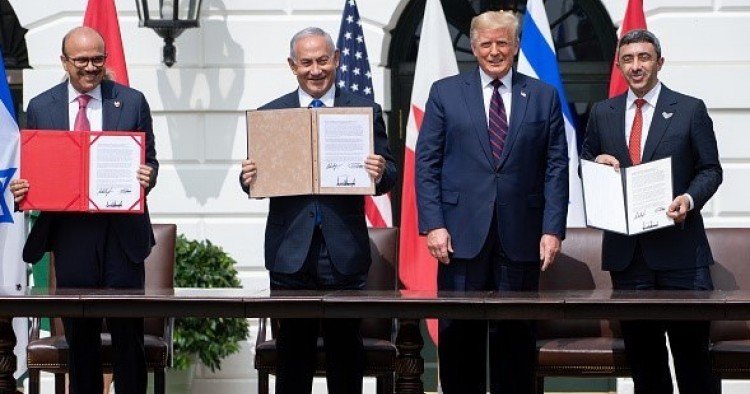Explore the historical context of the Abraham Accords over the past three years and its significance in Middle East diplomacy.
The Abraham Accords have emerged as a pivotal development in the complex landscape of Middle East diplomacy. Over the past three years, these accords have reshaped regional relations and garnered international attention. In this article, we embark on a journey through time to unravel the historical context and significance of the Abraham Accords.
A Milestone in Middle East Diplomacy: Abraham accord
The Abraham Accords, signed in 2020, marked a significant departure from the traditional approach to Middle East peace agreements. This diplomatic breakthrough involved the normalization of relations between Israel and two Arab nations, the United Arab Emirates (UAE) and Bahrain. It was a momentous achievement as it defied decades of hostilities and animosity in the region.
A Timeline of Key Events

To understand the full scope of the Abraham Accords, let’s take a closer look at the timeline of key events:
August 13, 2020: The United Arab Emirates becomes the first Gulf nation to officially recognize Israel, leading to the establishment of diplomatic ties.
September 15, 2020: Bahrain follows suit, signing a historic peace agreement with Israel at the White House.
Subsequent Developments: Other nations, including Sudan and Morocco, have also expressed interest in normalizing relations with Israel, marking a significant shift in regional dynamics.
Broader Implications
The Abraham Accords not only fostered diplomatic ties but also had broader implications for the Middle East:
Economic Opportunities: The accords opened up avenues for economic cooperation, trade, and investment between the signatory nations. This has the potential to spur economic growth and development in the region.
Regional Stability: The normalization of relations between Israel and Arab nations has the potential to contribute to greater regional stability by reducing tensions and conflicts.
Geopolitical Impact: The Abraham Accords have altered the geopolitical landscape of the Middle East, with new alliances and partnerships emerging.
The Road Ahead
As we reflect on the past three years of the Abraham Accords, it’s important to consider the road ahead. The accords have generated optimism for the possibility of additional nations joining the normalization process, further reshaping the region’s diplomatic dynamics.
Challenges and Criticisms
While the Abraham Accords have undoubtedly achieved significant milestones, they are not without challenges and criticisms. Some key points of contention and issues include:
Israeli-Palestinian Conflict: Critics argue that the accords do not address the longstanding Israeli-Palestinian conflict, which remains unresolved. The absence of a comprehensive solution to this issue has led to concerns about the accords’ long-term impact on regional stability.
Regional Reactions: While the UAE and Bahrain took bold steps in normalizing relations with Israel, the reaction from other Arab nations has varied. Some have welcomed the accords as a step towards regional peace, while others have expressed reservations or criticism.
Sustainability: The Abraham Accords have sparked discussions about sustainability and environmental concerns in the context of economic cooperation. It is important for the signatory nations to balance economic development with responsible environmental practices.
Global Diplomacy: The global diplomatic landscape has also been affected by the Abraham Accords. Nations outside the Middle East have been monitoring the developments closely, and some have sought to play a role in the evolving dynamics of the region.
The Role of International Players
The United States played a pivotal role in brokering the Abraham Accords. The Trump administration’s approach to Middle East diplomacy prioritized bilateral agreements and encouraged Arab nations to normalize relations with Israel. The Biden administration has indicated its support for the accords, maintaining a stance of fostering regional stability.
Future Prospects and Challenges
As we look to the future, several questions and challenges arise:
Expansion of the Accords: Will more nations join the Abraham Accords, and if so, what impact will this have on the region? The potential for additional signatories is a topic of ongoing speculation.
Palestinian Question: The resolution of the Israeli-Palestinian conflict remains a crucial factor in the stability of the Middle East. The accords may influence the path towards a two-state solution or other diplomatic initiatives.
Economic Opportunities: The economic aspects of the Abraham Accords hold tremendous potential. Will the economic cooperation and investments outlined in the accords materialize and lead to tangible benefits for the region?
In Conclusion
The history of the Abraham Accords is still unfolding, and its full impact may not be realized for years to come. While it has undeniably brought about significant changes in Middle East diplomacy, there are complex challenges that need to be addressed.
The world will continue to watch closely as the Abraham Accords evolve, hoping that they will contribute to lasting peace, economic prosperity, and improved relations among nations in the Middle East. As the journey continues, it is essential to remain engaged in constructive dialogue and diplomatic efforts that foster cooperation and stability in the region.
ALSO READ ;Canadians’ Indian Visas Have Been Suspended In Accordance With Official Directive: BLS International




































